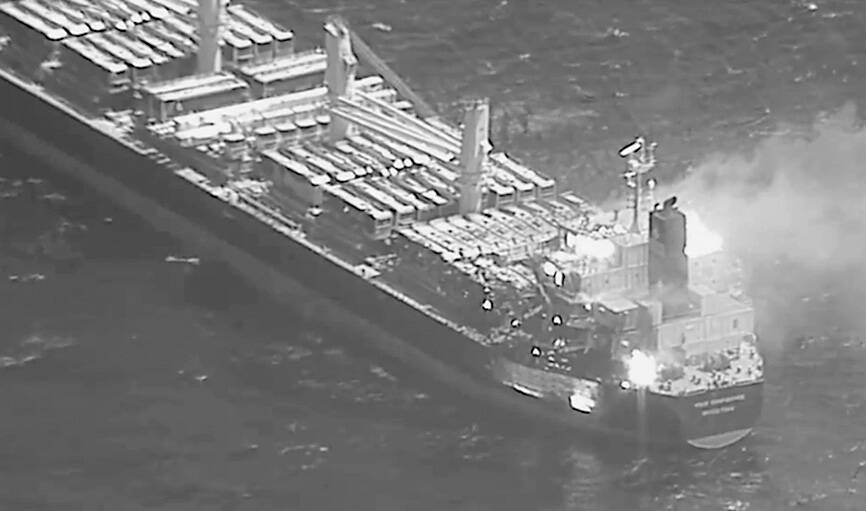Yemen’s Houthi rebels claim to have a new, hypersonic missile in their arsenal, Russia’s state media reported on Thursday, potentially raising the stakes in their attacks on shipping in the Red Sea and surrounding waterways against the backdrop of Israel’s war with Hamas in the Gaza Strip.
The report by the state-run RIA Novosti news agency cited an unidentified official, but provided no evidence for the claim. It comes as Moscow maintains an aggressively counter-Western foreign policy amid its grinding war on Ukraine.
However, the Houthis have for weeks hinted about “surprises” they plan for the battles at sea to counter the US and its allies, which have so far been able to down any missile or bomb-carrying drone that comes near their warships in Middle East waters.

Photo: AP
On Thursday, Abdul Malik al-Houthi, the Houthis’ secretive supreme leader, said the rebels would start hitting ships heading toward the Cape of Good Hope in Africa’s southern tip. Until now, the rebels have largely struck ships heading into the Red Sea toward the Suez Canal, and such an escalation would target the longer, alternative route used by some vessels. It remains unclear how they would carry any possible assault out.
Meanwhile, Iran and the US reportedly held indirect talks in Oman, the first in months amid their long-simmering tensions over Tehran’s rapidly advancing nuclear program and attacks by its proxies.
Iran, the Houthis’ main benefactor, claims to have a hypersonic missile and has widely armed the rebels with the missiles they now use.
“The group’s missile forces have successfully tested a missile that is capable of reaching speeds of up to Mach 8 and runs on solid fuel,” a military official close to the Houthis said, according to the RIA report.
The Houthis “intend to begin manufacturing it for use during attacks in the Red Sea and the Gulf of Aden, as well as against targets in Israel,” the official said.
Mach 8 is eight times the speed of sound. Hypersonic weapons, which fly at speeds higher than Mach 5, could pose crucial challenges to missile defense systems because of their speed and maneuverability.
Ballistic missiles fly on a trajectory in which anti-missile systems like the US-made Patriot can anticipate their path and intercept them. The more irregular the missile’s flight path, such as a hypersonic missile with the ability to change directions, the more difficult it becomes to intercept.
China is believed to be pursuing the weapons, as is the US. Russia claims it has already used them.
In Yemen, al-Houthi boasted that his fighters “continue to expand the effectiveness and scope of our operations to areas and locations the enemy never expects.”
He said they would prevent ships “connected to the Israeli enemy even crossing the Indian Ocean ... heading toward the Cape of Good Hope.”
The Houthis have attacked ships since November, saying they want to force Israel to end its offensive in Gaza, launched in response to Hamas’ Oct. 7 attack on southern Israel. However, the ships targeted by the Houthis have increasingly had little or no connection to Israel, the US or other nations involved in the war. The rebels have also fired missiles toward Israel, though they have largely fallen short or been intercepted.
The UK Navy yesterday said that a commercial ship was hit by a missile in the southern Red Sea in another suspected attack by Houthi militants.
The vessel said it “sustained some damage,” UK Maritime Trade Operations (UKMTO), a part of the navy that provides maritime security information, said on X. “The crew are reported safe and the vessel is proceeding to its next port of call.”
The assault happened at about 4am yesterday and 76 nautical miles (141km) off the Houthi-
controlled port of Hodeidah.
UKMTO did not name the vessel or give more information about it.
It was the second incident in the span of hours. Earlier, UKMTO said another ship reported two rockets flying over it.
Additional reporting by Bloomberg

Shamans in Peru on Monday gathered for an annual New Year’s ritual where they made predictions for the year to come, including illness for US President Donald Trump and the downfall of Venezuelan President Nicolas Maduro. “The United States should prepare itself because Donald Trump will fall seriously ill,” Juan de Dios Garcia proclaimed as he gathered with other shamans on a beach in southern Lima, dressed in traditional Andean ponchos and headdresses, and sprinkling flowers on the sand. The shamans carried large posters of world leaders, over which they crossed swords and burned incense, some of which they stomped on. In this

‘NO COUNTRY BUMPKIN’: The judge rejected arguments that former prime minister Najib Razak was an unwitting victim, saying Najib took steps to protect his position Imprisoned former Malaysian prime minister Najib Razak was yesterday convicted, following a corruption trial tied to multibillion-dollar looting of the 1Malaysia Development Berhad (1MDB) state investment fund. The nation’s high court found Najib, 72, guilty on four counts of abuse of power and 21 charges of money laundering related to more than US$700 million channeled into his personal bank accounts from the 1MDB fund. Najib denied any wrongdoing, and maintained the funds were a political donation from Saudi Arabia and that he had been misled by rogue financiers led by businessman Low Taek Jho. Low, thought to be the scandal’s mastermind, remains

Near the entrance to the Panama Canal, a monument to China’s contributions to the interoceanic waterway was torn down on Saturday night by order of local authorities. The move comes as US President Donald Trump has made threats in the past few months to retake control of the canal, claiming Beijing has too much influence in its operations. In a surprising move that has been criticized by leaders in Panama and China, the mayor’s office of the locality of Arraijan ordered the demolition of the monument built in 2004 to symbolize friendship between the countries. The mayor’s office said in

FIGHTING CONTINUES: Thai military dropped 40 bombs on border areas, Cambodia said, while Bangkok said Phnom Penh launched heavy attacks and damaged homes Cambodia yesterday accused Thailand of intensifying its bombardment of disputed border areas, even as officials from the two countries attend a multi-day meeting aimed at negotiating an end to deadly clashes. The neighbors’ long-standing border conflict reignited this month, shattering an earlier truce and killing more than 40 people, according to official counts. About 1 million people have also been displaced. Cambodian and Thai officials were in their third day of talks at a border checkpoint, with ministers of defense from the two countries scheduled to meet today. However, the Cambodian Ministry of National Defense said Thailand’s military carried out a heavy